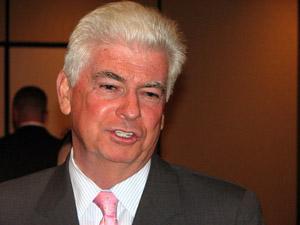Lawmakers and bank donations
Sen. Chris Dodd (D-CT), chair of the Senate Banking Committee (Image: flickr user David Berkowitz (cc:by-nd))
Twelve of the Senate’s top recipients of banking and insurance donations work on the Banking Committee, according to the Center for Responsive Politics, a D.C. based government watchdog. That’s the same committee charged with writing the new rules. Last year when Congress turned its attention toward the financial industry companies doubled campaign donations to lawmakers.
As Congress rewrites banking regulations, financial executives continue to donate millions of dollars to lawmakers. Bill Allison, senior fellow at the Sunlight Foundation, argued consumers are left in the mix. "The financial services industry has really gotten a pass," Allison said.
He said campaign donations could explain why Congress passed TARP — which gave billions to struggling banks — but was slow passing stricter regulations. Allison said lawmakers floated different ideas: The administration proposed giving the Fed more power while Congress introduced other plans. But, Allison said, it’s "not the kind of action you would expect when what’s caused our financial problem has really been the financial sector."
Under the Obama Administration plan, hedge funds would register with the Securities and Exchange Commission and the government would enforce risk assessments. Hedge funds have more than tripled their donations to lawmakers in the last year. Allison said financial firms are trying to slow down new regulations. He said that bodes well for lawmakers but hurts their constituents.
"As long as this is an issue they can raise money from it because all of these industries are interested in influencing the outcome of that legislation. And they will be going to the members and going to their fundraisers and writing those checks. And so it goes in Washington," Allison lamented.
Lawmakers see it differently.
While Sen. Bob Corker (R-TN) isn’t up for reelection until 2012, finance companies donated $500,000 during the last election cycle.
Corker said the industries aren’t buying his ear: "I know it’s hard for people to believe — I have no idea how much I have received from various entities. And you know these are huge races — my race in particular was a $25 million race, and I know that people think that somehow or another has an affect, but it just doesn’t," Tennessee’s junior senator said.
Sen. Chris Dodd (D-CT), chair of the Senate Banking Committee, received the 3rd most in donations from the financial industry. He denied the committee is dragging its feet.
He said the committee remains occupied helping homeowners and protecting consumers from credit card companies: "We’re doing all the work to setting up the debate in the fall on the modernization issues. Not to mention the oversight on TARP funds, as well as on hearings on the federal modernization of regulations, so we’re getting the work done on both and have gotten a lot of work done already," Dodd boasted.
Sen. Bob Bennett (R-UT) received more than $100,000 from finance companies. Bennett said lobbyists try to twist his arm but denied their influence. "Probably every senator has had the experience, of having people who have given me campaign contributions because they’ve approved of my positions, come to me and ask me to do things that are then not appropriate. And I’ve told them, what you are asking for is not appropriate."
Many fear lobbyists’ easy access to legislators still has an effect. Allison said members begin to see things from the lobbyists’ point of view.
"Members end up spending a lot of time with lobbyists and donors from these industries and hearing their concerns, but what they don’t hear are the concerns of the general public. And Congress ends up skewing towards the industries they are supposed to be regulating or overseeing," Allison said.
Lawmakers plan to deal with financial regulations this fall. Watchdog groups expect a big spike in campaign donations from the industry, and only lawmakers know if all that cash will influence their votes.
Created by Bureau Chief and Executive Producer Melinda Wittstock, Capitol News Connection from PRI provides insightful, localized coverage of participating stations’ congressional delegations.
